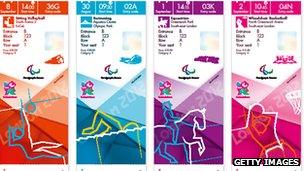London 2012: IOC begins Olympics tickets investigation
- Published
- comments

Claims have been made that tickets were being sold way above their face value
The International Olympic Committee has begun an investigation into claims Olympics representatives were willing to sell thousands of tickets for the London Games on the black market.
The IOC's ruling executive board met after fresh claims by <link> <caption>the Sunday Times</caption> <url href="http://www.thesundaytimes.co.uk/sto/" platform="highweb"/> </link> involving more than 50 countries.
Tickets for top events were said to be priced at up to 10 times face value.
A UK member of the board, Sir Craig Reedie, said the IOC would consider improvements to ticket sales systems.
"We will see what improvements we can build in to a more modern system, because it's very important that we protect the integrity of the ticket distribution system for Olympic games," he told the BBC.
The IOC has also referred the allegations to its independent ethics commission.
Former LibDem leader Sir Menzies Campbell, a member of the Olympic Board, called for offending countries to lose future allocations of tickets.
He said it was the responsibility of the IOC to regulate ticket allocations to member countries and was "not at the discretion of the London organisers".
The UK's Olympics organiser, Locog, denied claims its chairman, Lord Coe, was persuaded to hand over extra tickets to an IOC national representative.
The Sunday Times has submitted a dossier of evidence detailing claims that Olympic officials and agents had been caught selling thousands of tickets on the black market for up to 10 times their face value, says BBC Sports News correspondent James Pearce.
The IOC could also review how Olympic tickets are distributed among member countries - more than one million were distributed to those taking part in the Games.
Sir Menzies Campbell, a former Liberal Democrat leader who is on the <link> <caption>Olympic Board</caption> <url href="http://www.london2012.com/about-us/the-people-delivering-the-games/stakeholders/the-olympic-board/" platform="highweb"/> </link> , - which helps oversee London 2012 - told the BBC it was a "thorough disgrace".
"The sanctions [for offending countries] should be not just that the tickets get cancelled for this Olympic Games but that tickets are not awarded on future occasions," he added.
The Sunday Times alleges, during a two-month investigation in which reporters posed as Middle Eastern ticket touts, it found corruption involving people representing 54 separate countries.
Ticketing policy
Accusations include an allegation a member of the Greek Olympics Committee said he had "persuaded" Lord Coe, chairman of the London organising committee, Locog, to give Greece more tickets on the pretext demand had outstripped supply.
Locog denies the claim.
A spokeswoman said: "With regard to 'boasts' by the Greek Olympic Committee' (HOC) that discussions on tickets took place with Sebastian Coe, we can confirm this is untrue.
"Seb received a letter from the HOC (as he did from other NOCs) and responded saying that tickets had been allocated in accordance with the IOC's ticketing policy. There was no further contact - either formal or informal - on this subject."
More than one million London 2012 tickets were distributed abroad among all the nations taking part in the Games, but the IOC has strict rules to try to combat touts.
National Olympic committees must ensure that their allocation is only sold within their own region.
Last month a senior Ukrainian Olympic official resigned after being filmed by the BBC offering tickets for cash.
'Strongest sanctions'
The IOC said in a statement on the latest claims: "The International Olympic Committee (IOC) has moved quickly to deal with allegations that some National Olympic Committees (NOC) and Authorised Ticket Resellers (ATR) have broken rules relating to the sale of Olympic tickets.
"The IOC takes these allegations very seriously and has immediately taken the first steps to investigate.
"Should any irregularities be proven, the organisation will deal with those involved in an appropriate manner.
"The NOCs are autonomous organisations, but if any of the cases are confirmed the IOC will not hesitate to impose the strongest sanctions.
"The IOC has also determined that it will take on board any recommendations coming out of the inquiry to improve the way that tickets are allocated and sold internationally in the future."
London 2012 organising committee Locog said: "Rules and regulations for selling London 2012 tickets to international fans are clear and unambiguous.
"National Olympic Committees (NOCs) and their Authorised Ticket Sellers (ATRs) sign a contract with Locog agreeing to specific terms and conditions.
"The International Olympic Committee's (IOC) has launched an investigation in to the allegations and we will support them in any way we can. None of the tickets in question came from the allocation to the British public.
No tickets intended for the British market were involved, it added.
- Published22 May 2012
- Published15 June 2012
- Published21 May 2012
- Published9 May 2012